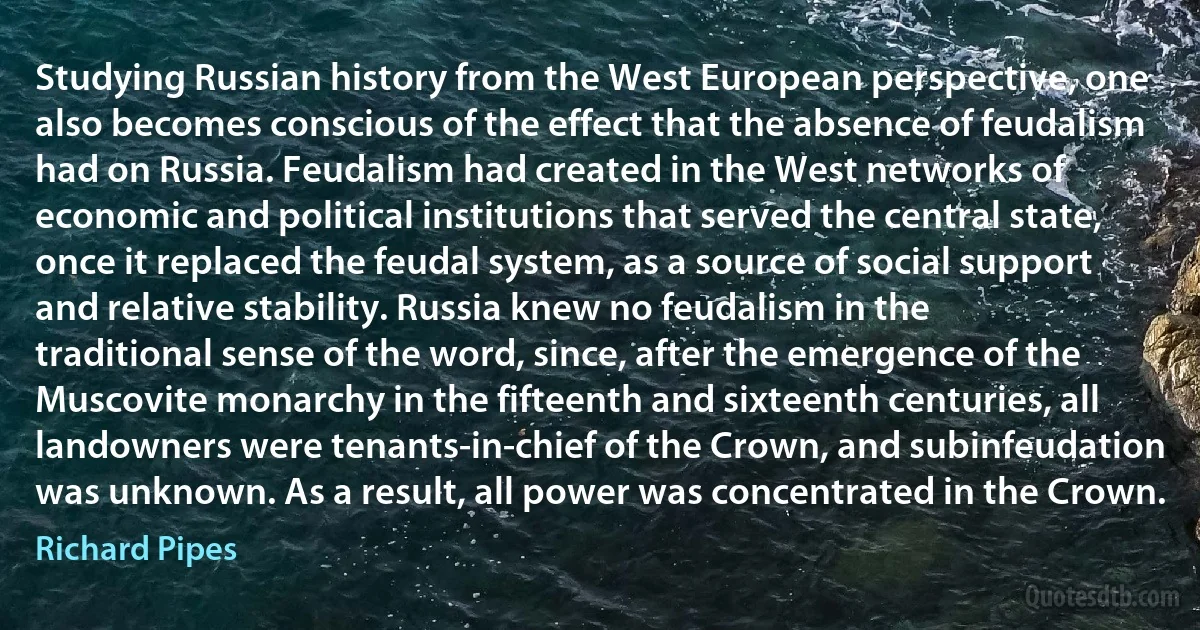
Studying Russian history from the West European perspective, one also becomes conscious of the effect that the absence of feudalism had on Russia. Feudalism had created in the West networks of economic and political institutions that served the central state, once it replaced the feudal system, as a source of social support and relative stability. Russia knew no feudalism in the traditional sense of the word, since, after the emergence of the Muscovite monarchy in the fifteenth and sixteenth centuries, all landowners were tenants-in-chief of the Crown, and subinfeudation was unknown. As a result, all power was concentrated in the Crown.
Richard PipesRelated topics
absence central crown emergence feudalism fifteenth history monarchy once power result sense sixteenth source stability state support traditional unknown west wordRelated quotes
The central psychological endeavor of Kierkegaard may be summed up under the heading of the question he pursued relentlessly: How can one become an individual? The individual was being swallowed up on the rational side by Hegel's vast logical "absolute Whole," on the economic side by the increasing objectification of the person, and on the moral and spiritual side by the soft and vapid religion of his day. Europe was ill, and was to become more so, not because knowledge or techniques were lacking but because of the want of passion, commitment. ""Away from Speculation, away from the System," he called, and "back to reality!"

Rollo May
2) "the a of différance also recalls that spacing is temporization, the detour and postponement by means of which intuition, perception, consummation - in a word, the relationship to the present, the reference to a present reality, to a being - are always deferred. Deferred by virtue of the very principle of difference which holds that an element functions and signifies, takes on or conveys meaning, only by referring to another past or future element in an economy of traces. This economic aspect of différance, which brings into play a certain not conscious calculation in a field of forces, is inseparable from the more narrowly semiotic aspect of différance.

Jacques Derrida
Anxiety occurs because of a threat to the values a person identifies with his existence as a self ... most anxiety comes from a threat to social, emotional and moral values the person identifies with himself. And here we find that a main source of anxiety, particularly in the younger generation, is that they do not have viable values available in the culture on the basis of which they can relate to their world. The anxiety which is inescapable in an age in which values are so radically in transition is a central cause of apathy ... such prolonged anxiety tends to develop into lack of feeling and the experience of depersonalization.

Rollo May
Our country is suffering from the lack of food. We don't have rice for the military. Our country is in a state of anarchy because of the dysfunctional food rationing system. The administration department is responsible for this mess, as well as the Party officials. The Party's Central Committee members have failed their duty in generating a revolutionary spirit, diminishing the Party's effectiveness. We must solve the food problem according to socialist principles, and we must not rely on individuals. If we let the people solve the problem on their own, only merchants and markets will prosper. Then, selfishness will rule our society and destroy our system of true equality.

Kim Jong-il
In its own more confused, less advanced way, New Dealism too has spread abroad the stress on the state as against the individual, planning as against private enterprise, jobs (even if relief jobs) against opportunities, security against initiative, "human rights" against "property rights." There can be no doubt that the psychological effect of New Dealism has been what the capitalists say it has been: to undermine public confidence in capitalist ideas and rights and institutions. Its most distinctive features help to prepare the minds of the masses for the acceptance of the managerial social structure.

James Burnham
